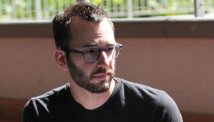As he nears his own retirement, Cardinal Francis George will head to Rome likely to play a powerful role in choosing Pope Benedict XVI's successor and charting a course for the next chapter of the Roman Catholic Church.
Most recently focused on reaching a new generation and preserving Catholic identity in an increasingly secularized world, George, the College of Cardinals' elder statesman, is expected to encourage his colleagues to choose a pontiff who will do the same.
"Cardinal George is a highly respected member of the College of Cardinals and his views on the church's situation and the next pope will be carefully considered by his brother cardinals," said conservative Catholic scholar George Weigel, who recently wrote a book titled "Evangelical Catholicism."
Cardinal George's colleagues turn to him not just because he's the leader in Chicago, where parishioners are as diverse as the global church. He's also traveled widely in Africa and Latin America as the vicar general of the Missionary Oblates of Mary Immaculate and lived and worked in Rome. Meanwhile, in the U.S., he has served as president of the national bishops conference and led the charge for a zero-tolerance policy on clergy sexual abuse.
"Everyone at the Vatican trusts him," said John Thavis, a longtime Rome correspondent for the Catholic News Service and author of "The Vatican Diaries: A Behind-the-Scenes Look at the Power, Personalities and Politics at the Heart of the Catholic Church." "He has an excellent reputation as a person who understands both Rome and the pastoral side of issues. He's a very thoughtful person, yet he's not afraid to say what he believes. ... The cardinals appreciate that."
George said Monday that he will head into his second conclave of cardinals with a clear set of priorities and a strategy for selecting Benedict's successor. Because of Pope John Paul II's 27-year papacy, most cardinals faced a steep learning curve in the days leading up to and during the 2005 conclave, the top-secret closed-door process to select the next pope.
The next conclave likely will begin 15 to 20 days after Benedict's resignation becomes effective Feb. 28. At that time, the College of Cardinals will govern the church collectively and informal discussions will begin. George said he will use that time more wisely, asking better questions and figuring out "how to move beyond impressions to find out really what people are going to say about another cardinal."
"I'd like to make better use of the time before the voting begins," he said.
Once the doors of the Sistine Chapel close, the activities inside are carefully choreographed, George said. Cardinals are seated in order of their elevation. Prayers are recited in Latin, instructions are printed in Italian and the participants speak a variety of languages. In April 2005, George sat between the Viennese cardinal with whom he spoke German and the cardinal from Mexico City, with whom he spoke Spanish.
"Until you take the first ballot, you really don't know who has strength and who does not," George said. "It's a very serious moment. You stand there with a ballot in your hand facing Michelangelo's fresco of the Last Judgment and you say … a pretty serious oath. You put your life and salvation on the line. That first ballot tells you what people really think."
George said the challenge facing cardinals next month will be finding a leader who can maintain a degree of continuity while moving the church in a bold new direction.
"I have some sense of where we must both keep our attention focused and also where we have to put some attention where perhaps we haven't been able to do that yet," he said. "But I'd like to clarify that more in my own mind before I say."
Nearly eight years ago, the sexual abuse scandal dominated headlines. Within minutes of Benedict's election, George sought assurances from the pope-elect that he would renew church rules that facilitated the permanent removal from ministry of sexually abusive priests in the U.S. That experience in dealing with a scandal that's now rippling across Europe gives George additional credibility with his colleagues, experts say.
But his experience traveling as a missionary helps too. George confirmed Monday that there are several Latin American cardinals who would make serious contenders.
"If you look at where the church is strong in terms of population, in terms of the faithful, it would be in Latin America or Africa," he said. Popes historically hail from Europe.
"That would be an appropriate question: Should we look elsewhere?" George said.
Thavis said he has never ruled out an American pope, but that's contrary to conventional wisdom.
"The standard thinking is 'An American? Never. They already run the world. They want to run the church too?'" Thavis said. "But I've never heard a cardinal say that."
George, however, explained that cardinals place more weight on personalities than geography.
"Who can govern the church? Who can teach? Who can sanctify?" he said. "Who can function as a papacy?"
"It matters less where someone is from," George continued. "It's not a representative office. … It's an office that represents Christ."
The Rev. Donald Senior, president of Catholic Theological Union, said he thinks this conclave could be the moment when cardinals give serious consideration to a candidate from the Southern Hemisphere.
George is "going to represent a perspective that's looking away from Europe and more an appreciation for the Southern Hemisphere, the Third World and mission territories. That's been his life," Senior said.
"Some of the other cardinals will be coming from much more ethnocentric types of experiences, not the kind of diversity that Chicago will offer and that his background as vicar of a missionary order will have. I suspect his sympathies align in that direction. I think they will be deliberating whether to turn at this point to a pope not from a European context. The cardinal would have a lot to say," he added.
mbrachear@tribune.com
Twitter @tribseeker


